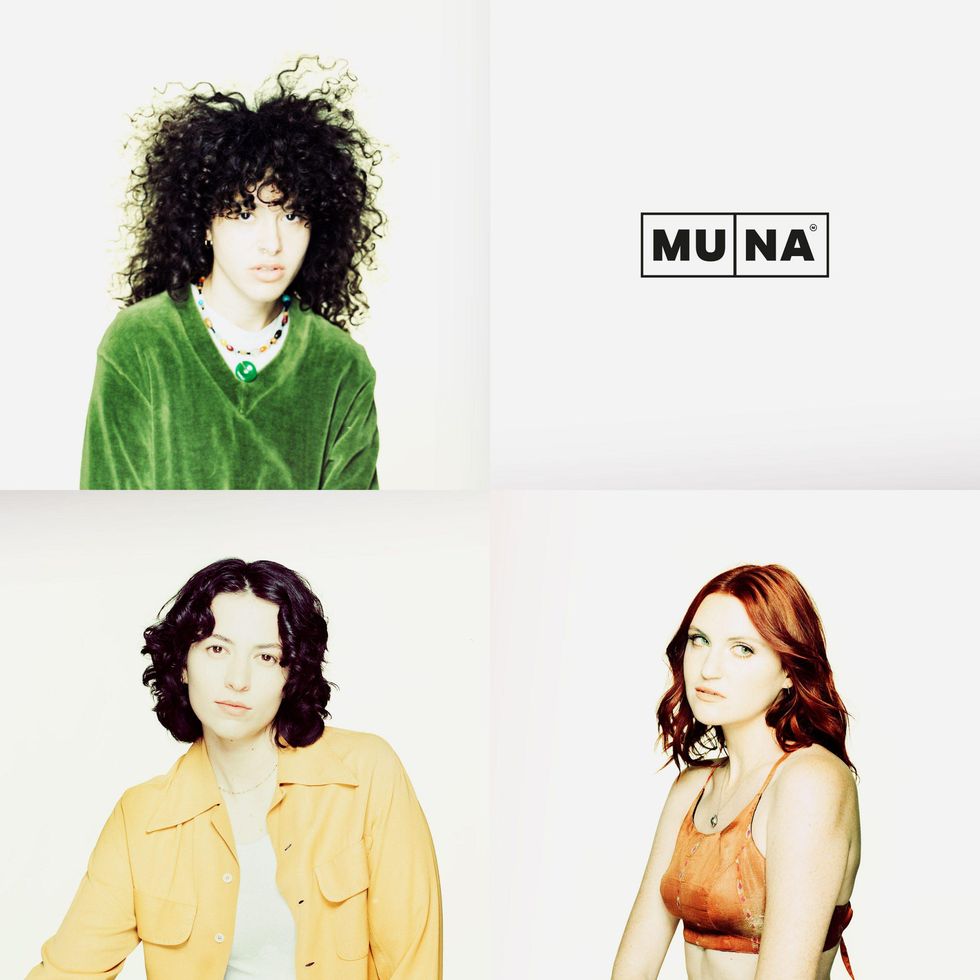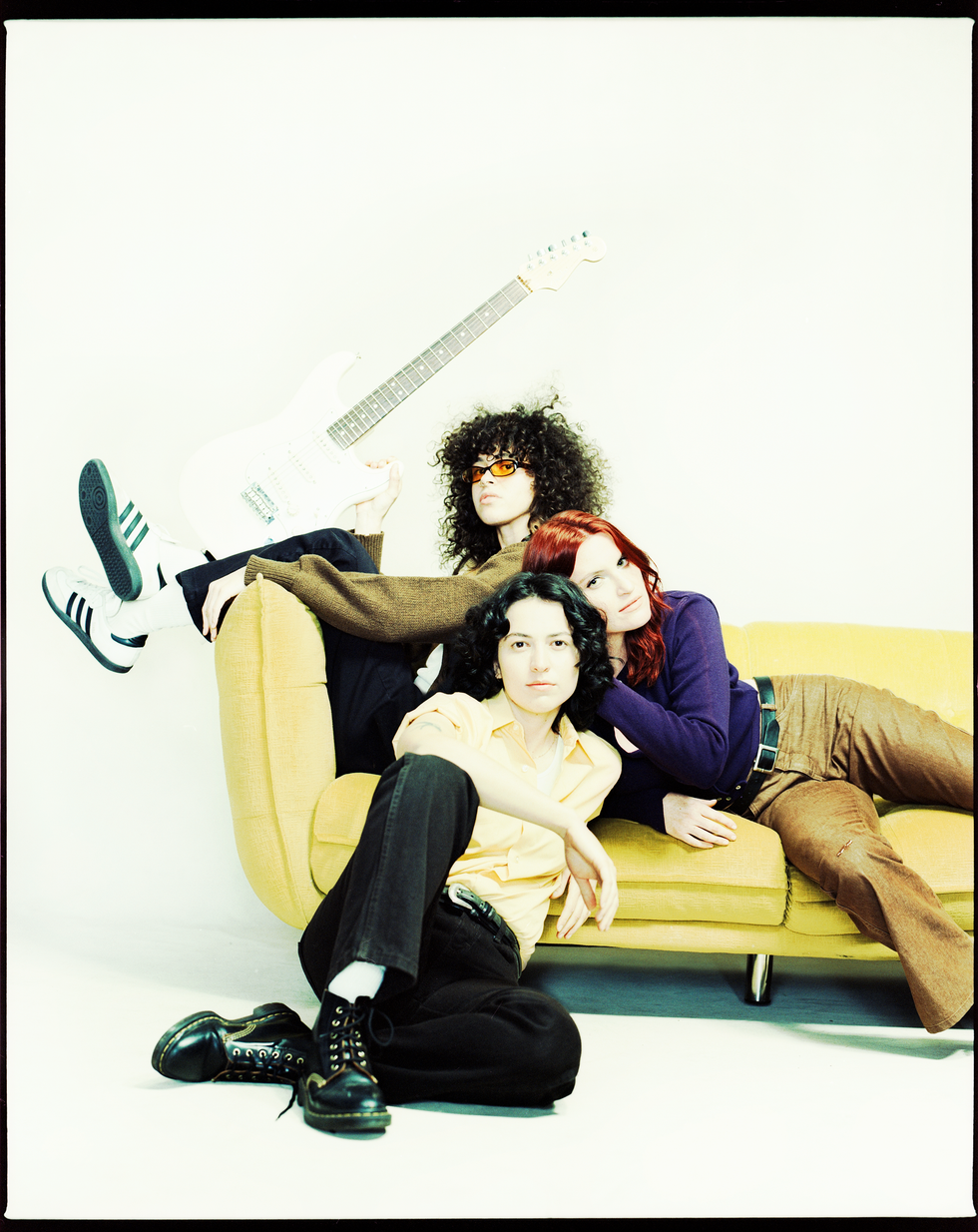
For MUNA’s self-titled third album, they had an immersive mood board for what it should encompass that included a combination of “Lilith Fair core,” the world of 2000s Max Martin pop and being “a dyke boy band.” As bandleader Katie Gavin says, “We didn't worry too much about it all making sense together because it’s all definitely a part of what goes into MUNA.”
The fact that the queer-pop trio, comprised of Gavin, as well as Naomi McPherson (who identifies as nonbinary) and Josette Maskin, has expanded their palette is no surprise. Since the release of their 2017 studio debut, the Los Angeles trio has been seemingly unstoppable. They’ve crafted a series of catchy and often dark synth-pop tracks that expertly capture everything from pining to unbridled joy.

Their second album, Saves the World in 2019 on RCA, further widened their fan base. “Our intention was being a big pop band, but we did get thrown into the machine a little bit,” Maskin explains. However, Gavin is quick to add that it wasn’t necessarily a bad thing: “It was really an experience that we all grew from and we wouldn't have been able to make the record that we made now without that experience.”
Despite the hype around Saves the World, the band was dropped by their label in 2020. “It made sense,” Gavin confesses. “We made two albums with them and we didn't make our money back.” But they don’t harbor any resentment. “I love our A&R guy from RCA and, overall, it was a positive experience working with him. He believes in our music so much.” They also largely maintained creative control throughout their tenure there. “I would say that when it happened it was hard for a little bit,” Gavin pauses, before adding, 'But we also had a sense of what we had built.”
Ultimately it was a blessing. “If we were gonna continue being with RCA, we wouldn't have been able to make the album that we wanted to make or make the music that we wanted to make because we were in a bind financially,” McPherson adds.
Despite an uncertain future, they weren’t completely directionless. Before they were dropped they had some interest. “We had heard whispers that Phoebe [Bridgers] was interested in signing us," Gavin calls. Bridgers had been in the process of launching her imprint, Saddest Factory, which has signed artists including Claud, Charlie Hickey and Sloppy Jane. It didn’t take much for them to realize that signing with Bridgers was the right move. “I'm just really grateful the way that everything has worked out,” she adds.
Cut to September 2021, the band announced their signing with the buoyant queer love anthem, “Silk Chiffon,” which featured an assist from Bridgers herself. With lyrics like, “I’m high and I’m feeling anxious/ Inside of CVS,” and, “Life’s so fun,” the song went viral and quickly became a contender for the song of the summer.
“God bless ‘Silk’!” Maskin exclaims. It was a more than promising restart for the band. “It just felt so good that people were liking it, and that people thought it was cheeky and they liked the video,” McPherson says. “The whole journey with that song has been so blessed for us in the way that it feels to play it live — and for me how it feels to listen to it.”
With its success, could there be another Bridgers and MUNA collaboration on the horizon? “The lines of communication are open,” Gavin says. “If something feels natural. I did sing group background vocals for a song of hers that's not released yet.”
“Silk Chiffon” was undoubtedly a promising sign that MUNA’s latest era would perhaps be their most affecting. Though it might be easy to think that the combination of the pandemic and being dropped by their label could have left them in a lull, it couldn’t be further from the truth. The group never stopped working. While many during the pandemic found themselves in a period of self-reflection, Gavin had already done so two years prior. “I think it really made us more of ourselves, and I think that is quite fitting in terms of the album that we ended up making and it being our self-titled,” she says of the time.
Where Saves the World was in “a very heady, reflective, internal place” and ultimately felt like therapy for Gavin, their self-titled LP was a huge release. “It felt like a big weight off my shoulders,” Gavin explains. It allowed her to return to more embodied songwriting that focused on relationship storytelling, since she was open to being in one herself again. “One of the big themes for this record is a very hard-earned sense of freedom, joy and agency,” Gavin says. “This is an attempted depiction, in some ways, of what it's meaning to me to become more emotionally mature and navigate love.”

Their wistful track, “Loose Garment,” Gavin says is an apt metaphor for how they used to process heartbreak (“I used to wear my sadness, like a choker.”) “In the past, a lot of our records have these harder emotions,” Gavin explains. “They have a very tight grip and I'm very lost inside of them.” So MUNA still encompasses the band’s full-scale emotions, but they are much more self-aware and willing to endure the highs and lows.
The trio also blurs genres on MUNA, oscillating from shimmery pop with hints of industrial undertones to country-pop. During the recording of their sophomore album, MUNA was admittedly obsessed with Kacey Musgraves’ Golden Hour. As self-professed fans of both Musgraves and Shania Twain, who they always have on the brain, it’s easy to see their influence on tracks like the shimmery country power ballad “Kind of Girl” and the country-pop cut “Anything But Me.”
Ultimately, though, MUNA isn’t looking to be boxed in by a particular genre. They’re looking for something that is authentic to their group as a whole. “We just follow the feeling,” McPherson says. “And if it feels like it could be a moment for that [country] we just go for it.”
But if they had to sum up their latest effort? “This record is definitely our horniest record that we've ever made, which I think is pretty cool,” Gavin laughs.
For MUNA, the wild ride thus far has had little pull on their bond and they want to keep it that way. “I dream of us doing this and still liking each other for a long time, and having this collaboration be fruitful,” Maskin says. The only person they’d add into their mix — at least for collaboration — if they could? “Kehlani,” Gavin adds.
But one thing's for sure: MUNA isn’t going anywhere.
Photography: Isaac Schneider
From Your Site Articles
- MUNA — "Silk Chiffon (feat. Phoebe Bridgers)" - PAPER ›
- MUNA and The Knocks Miss Dancing in Basements on "Bodies ... ›
- Hole Drummer Patty Schemel Interviews MUNA for Pride - PAPER ›
- Ranking The Top Boy Band Moments - PAPER Magazine ›
- MUNA Talk Next Album - PAPER Magazine ›
- MUNA's Katie Gavin Talks Solo Album "What a Relief" - PAPER Magazine ›
Related Articles Around the Web